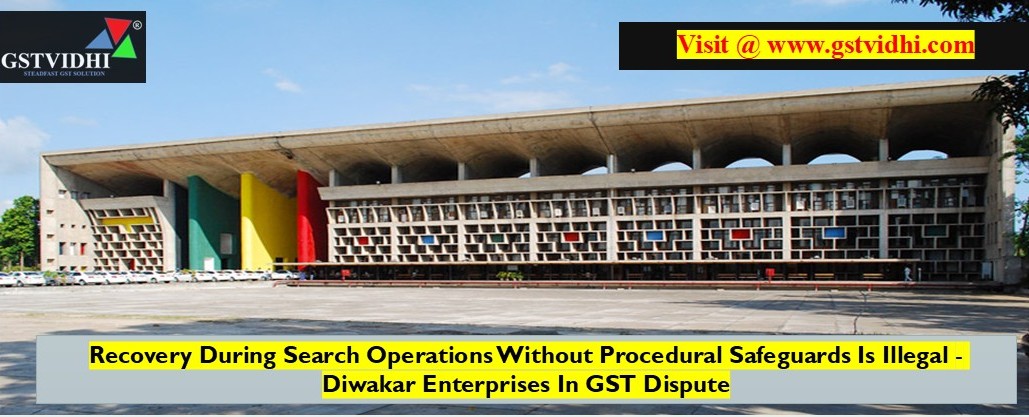
Recovery During Search Operations Without Procedural Safeguards
Is Illegal - Diwakar Enterprises In GST Dispute
Background
of the Case
Diwakar Enterprises Pvt.
Ltd., engaged in the manufacturing of lead and related products, filed a writ
petition before the Punjab & Haryana High Court seeking:
1. Refund
of ₹1,99,90,000 allegedly recovered under coercion during
a GST search.
2. Unblocking
of ITC worth ₹24,18,516 which was frozen by the department
without due process.
The company alleged that
GST officials conducted a search on 14 January 2021 and pressured the director,
Mr. Abhinav Sahaya, to deposit the amount. A further ₹25 lakhs was also
allegedly extracted during a subsequent search. The petitioner claimed these deposits
were made under duress and without authority of law, violating
their constitutional rights.
· Case
Name: Diwakar Enterprises Pvt. Ltd. v. Commissioner of
CGST and Another
· Court:
High Court of Punjab and Haryana at Chandigarh
· Order
No.:
CWP-23788-2021
· Date
of Decision: 14 March 2023
Submissions
by the Petitioner
- The GST department forcefully
recovered ₹1.99 crores from the Director during the search without any
lawful basis or issuance of receipt.
- These payments were made under
protest, as evidenced by contemporaneous objections.
- The petitioner was later served with
a show cause notice demanding ₹4.04 crores, out of which ₹2.34 crores were
confirmed by respondent No. 2, who was investigating a different matter.
- The input tax credit (ITC) blocked
was later unblocked, rendering that part of the writ infructuous.
- The refund claim was pressed on the
ground that voluntary payment under Section 74(5) must be based on
free consent, which was absent in this case.
Submissions
by the Respondents
- The department claimed the payment
was voluntary, citing Form GST DRC-03, where the taxpayer
marked the payment reason as "voluntary."
- It was denied that any coercion or
illegal detention took place.
- The respondent argued that prima
facie evidence indicated fake ITC claims involving multiple suppliers.
- Reliance was placed on judgments
where investigation by multiple GST authorities in parallel cases was
upheld as valid.
Court’s
Observations
The High Court made
important constitutional and procedural observations:
- Article 265
mandates that tax can only be collected with authority of law.
- Article 300A
protects against deprivation of property without lawful justification.
- The Court held that Section 74(5)
allows for voluntary deposit only before issuance of notice, and only
if truly voluntary.
- In this case, there was no
acknowledgement (Form DRC-04) from the Proper Officer, and the manner
of recovery raised serious doubt about voluntariness.
- The Court relied on multiple
precedents, notably:
- Vallabh Textiles v. Senior
Intelligence Officer, Delhi High Court
- Bundl Technologies (Swiggy) v. Union
of India, Karnataka High Court
- Bhumi Associates v. Union of India,
Gujarat High Court
These cases emphasized that tax recovery during search without due
process is unconstitutional and illegal.
Final
Judgment and Relief Granted
The High Court partly
allowed the writ petition, ruling:
“Respondent No. 1 is
directed to refund a sum of ₹1,99,90,000/- along with interest @6%.”
The Court found that the
payment was not in accordance with law and that Diwakar Enterprises was
deprived of its property without due legal process, justifying the
refund.
Conclusion
This judgment reinforces
the critical legal principle that tax cannot be recovered without lawful
authority, even if the taxpayer is under investigation. The ruling is
significant for GST taxpayers as it highlights that recovery during search
operations without procedural safeguards is illegal.
It also serves as a
reminder to tax authorities that constitutional rights under Articles 265
and 300A must be respected during investigation and enforcement.
The case of Diwakar
Enterprises sets a firm precedent for similar disputes involving coercive
recovery, and strengthens the jurisprudence around voluntariness and
procedural fairness under GST law.
Disclaimer: All the Information is based on the notification, circular advisory and order issued by the Govt. authority and information is strictly for educational purposes and on the basis of our best understanding of laws & not binding on anyone.
Click here